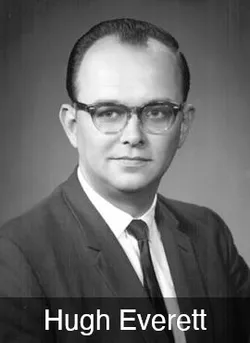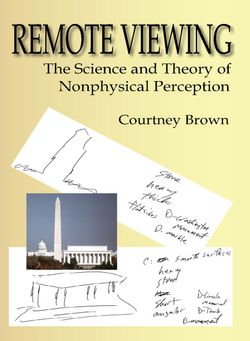What is Remote Viewing? Here's a Simple Explanation ...
Remote viewing is a controlled and trainable mental process involving psi (or psychic ability). It is used to transfer perceptual information across time and space. It is clear that remote viewing works in complete violation of the accepted "laws" of quantum and relativistic physics. So those "laws" are incomplete.  There is a theory about why it works on the level of physics, but that theory has not yet gained mainstream acceptance. The core of that theory involves an interpretation of quantum mechanics that is known as the "Other Worlds" interpretation of the famous "two-slit experiment" that was developed by Hugh Everett and published in 1957. A majority of mainstream physicists currently do not support that theory, but the number of physicists who do support it is significant and growing.
There is a theory about why it works on the level of physics, but that theory has not yet gained mainstream acceptance. The core of that theory involves an interpretation of quantum mechanics that is known as the "Other Worlds" interpretation of the famous "two-slit experiment" that was developed by Hugh Everett and published in 1957. A majority of mainstream physicists currently do not support that theory, but the number of physicists who do support it is significant and growing.
Remote-viewing procedures were originally developed in laboratories funded by the United States military and intelligence services and used for espionage purposes. The scientific understanding of the remote-viewing phenomenon has greatly advanced in recent years, and as a result the process of remote viewing can now be reliably demonstrated in both laboratory and operational settings. There are a number of styles of remote-viewing procedures that are popularly practiced, such as Scientific Remote Viewing (SRV), Controlled Remote Viewing (CRV), as well as a few others. Remote viewers use one or more of these styles to gather descriptive data of a "target," which is usually some place or event at some point in time. Remote viewing is always done under blind conditions, which means that the remote viewer must know nothing about the target when conducting the remote-viewing session. All of the various styles of remote viewing require both training and regular practice in order for a remote viewer to become proficient. Remote viewing is normally considered a controlled shifting of awareness that is performed in the normal waking state of consciousness, and it does not typically involve an out-of-body experience, hypnosis, an altered state of consciousness, or channeling.

Remote viewing is often performed in laboratory experiments involving psi functioning. The targets used in such experiments are normally considered "verifiable," which means that everything that needs to be known about such targets either has been or can be determined so that the remote-viewing data can be compared with the target facts. A great deal of research is currently being done with regard to remote-viewing processes. Researchers are trying to understand the underlying mechanism of psi functioning, as well as to develop theories that explain various known and repeatable phenomena associated with remote viewing.
It is a matter of historical record that remote viewing has been used operationally in the past with considerable success by the U.S. government for espionage purposes, and a number of books recounting such programs have been published. There was even an official (and largely positive) governmental evaluation of a significant part of the government's early remote-viewing program. Popular interest in remote viewing is often associated with this history. Current levels of governmental support for remote-viewing research and operations in the United States are not publicly known, although it is commonly assumed that efforts to utilize remote viewing for espionage purposes continues today, both in the U.S. and elsewhere.
The Farsight Institute is a nonprofit research and educational organization that is dedicated to understanding the remote-viewing phenomenon itself through the process of scientific experimentation. It is our belief that a more complete understanding of the remote-viewing phenomenon will have collateral benefits to much of science and society. Due to how the remote-viewing phenomenon manifests in controlled experiments, the remote-viewing phenomenon appears to be based on quantum-processes. Much of the research done at The Farsight Institute blends theories of quantum mechanics with interpretations of experimental remote-viewing data. This has lead to new insights into the remote-viewing phenomenon as well as the nature of time and physical reality. For example, new research indicates that alternate futures actually do exist, and that the past exists simultaneously with the present. New research also suggests that information transfer across time does not require enormous energy consumption that would be associated with worm hole singularities. These questions are among the most profound addressed by science today.